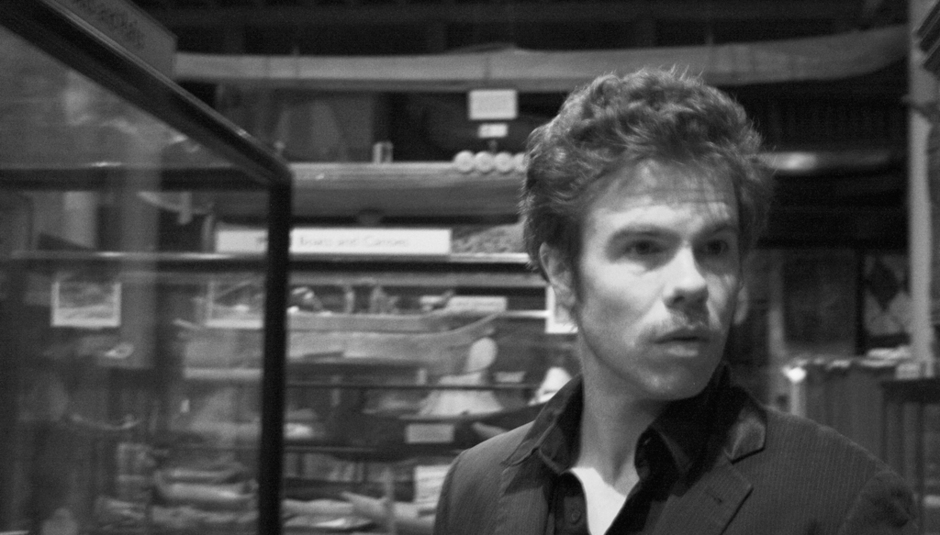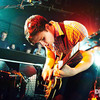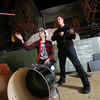As we take a seat in one of Oxford’s oldest pubs, the fact that Josh Ritter’s boots are thoroughly roughed up comes as no great surprise. He’s been giving them quite the workout. Having recently crowned his abundant back catalogue with a splendid collection of new songs (So Runs the World Away), he remains, overwhelmingly, a man of the road; a considered performer roaming far and wide with a ceaseless vigour and sense of occasion. He has a novel in the offing too. On the eve of his 6-date UK tour there’s a cool focus in his eyes, a sense of real purpose and determination. It’s the perfect foil for his infectious affability, and it makes for great conversation…
DiS: So you've been touring in Europe for the past week. Did you get much of a chance to explore?
Josh: That's the best part about touring I think. You're very rarely in a place for more than 12-15 hours, but if you have a day off you might just get lucky. I remember having a day off in Barcelona when we did a whole European tour with The Swell Season and we kinda went everywhere. There's not many places or countries where I haven't been before, but it's great, almost like a sampler. It’s like when somebody sends you an amazing fruit basket - you see all these fruits that you're vaguely familiar with and you get one of each and you can go back and try to find it.
The choice of venues for your UK dates is quite striking. Did you have anything particular in mind when it came to putting the tour together?
Well, I really want each night to feel like an event. There's a show portion to it, and there's also a portion when you walk into a venue and say “hey this is pretty cool, this building looks like a giant Easter egg”. It's sort of like dressing up on stage - it doesn't matter necessarily what you dress up in as long as the intent is there, and I think that's really an important part of the show. It's a reflection of the effort that you've put into it. So sometimes it might not work, other times it does.
On a good night anywhere it feels the same. It feels like there's sort of a warm glow coming off the audience, I guess it's like a smell almost that just permeates. That’s a really great experience because you know when things are starting to work. The UK's a place that I have a lot of connections to. I lived here for a year when I was 10, I lived in Edinburgh for another year at college, and it’s the birthplace of so much important music.
What’s your experience of the festival scene here? I know you headlined 'End Of The Road' back in 2006…
End of the Road is a great example of a festival arising from the desire of people to have a more civilized, intimate experience listening to music. I loved playing there. The surroundings were a kind of ancient world/Olympian pastiche that seemed like an old world Las Vegas interpretation of some idyllic yesteryear. And the cider was amazing - hot, with a shot of brandy. I remember seeing Dawn Landes play and then asking her to come and have a drink with me at the cider truck.
I like to think of a festival as a chance to shoot your six guns straight up into the sky. You aim to make some noise, and you aim to give people a set that will bring them out to your own shows as well. The set times are usually a bit shorter and in that way choosing a set list is a bit like choosing songs to play at an open mic, which brings me back to my own roots.
Ah yes, you spent your early days playing lots of open mic didn’t you? How has that shaped you as a performer?
I think it's the beginning of everything. I always feel that if you're starting in an open mic then you're starting at the bottom of this 'music tree'. There's competitiveness there and there's also a time when you feel that you have to yield the floor to someone. If someone comes along and plays an amazing serious song, you're not gonna go out and play another serious song even if it's the only song you have ready, you're going to try and play something lighter. It's like a party and you're part of the party but you're not the only thing there.
You can be really selfish about what you want to do and that's not what people want to see on stage, they want to see somebody being elastic. That's such a metaphor for the rest of life - you're dealing with the situation more than anything else, and it's important to deal with it as gracefully as possible.
On record you come across with a lot of conviction and there's a serious tone to your albums. Do you feel that you’re wanting to portray different things on record in comparison to a live performance?
For better or for worse my confidence goes into writing songs, and I feel the conviction comes across on the record and then for the shows I'm just really happy to be there. It's kind of neurological, it's gotta be a Pavlov thing. I do think that there are monochromatic pictures that are simply stark black or stark white, but I always like the shading or as many colours as possible. Whether that's your facial expression changing, the up and down of the song or the dynamic of a whole show, it's all put together so that it keeps on changing. It is strange though that a show is so different from a record. You never know what a song is going to be like until you play it live for the first time.
So you have a new album out. What was the writing and recording process like?
So Runs the World Away was made in a kind of reverse sculpting way. A song like ‘Another New World’ was a big marble statue to begin with, but parts were missing or needed changing. Sam and the band and I worked hard at adding as many layers to the original statue as possible until it looked like the song was just a square solid block of marble. Then we carved it back down again with the new layers finessed in around the original. It was a process we couldn’t have come to without spending a lot of time together on the road and in close quarters. You really have to love the people you work with. Production goes so far beyond musical ideas.
The video for recent single 'The Curse' is a puppet epic. You seem to enjoy finding playful outlets for what might, at first, seem relatively serious subject matter
Yeah that was actually done by Liam, our drummer. He carved everything, made all of the set. He’s a talented guy. What's funny is, even with the most serious songs, it never feels like it's actually that serious. It's always so much fun to write and sing that I never really think about them being sad or anything.
I love that about Muriel Spark's stories you know, they’re so crazy and mean, it's like she's having so much fun killing people off. I hope that's what comes across in my songs. Like with Leonard Cohen - you could really tell that he was having a good time, even if he said he wasn't.
Taking the new record onto the road must have felt pretty liberating. Any songs that were already established live before the album was released?
Actually no, we kept it fairly close. I'd played 'The Curse' and 'Another New World' a few times, but everything else I left just because I wanted to make sure we were going to play them the way we recorded them. Now with the internet it's just so easy for everyone to hear all your treasures. I really like whipping the sheet off the statue and saying "here it is" and you can't quite get that unless you keep them hidden for a while.
There’s an amazing YouTube video of you playing ‘Lantern’ at the Tarrytown Music Hall recently. Tell us more about that
Yeah, that's the home of the legend of Sleepy Hollow. This guy just got all these glowsticks and handed them round and then everybody kinda whipped them out for that track. It was a huge surprise because it was a fan that I’d never met. Just a selfless, awesome thing to do.... real lo-fi.
You’ve suggested previously that The Animal Years is the best starting point for someone new to your music. Would that still be your advice?
It’s pretty hard to direct people in any direction because the music changes so much, and I feel like that's really the point. If people are paying money to buy your record, cause that still happens sometimes, what they're really giving you is the chance to go and make something else. It's a trust thing. If they trust you, they'll give you the money and they won't feel bad. Even if they don't like it, they trust that you're working hard on it and you're going to go and make it into an opportunity to produce something else.
So, yeah, pointing people in directions is hard because I want it to be a really personal thing. There are songs I’m particularly proud of like 'Girl in the War' or the 'Remnant' on the new record because I just forced them out, but they may not be important to anyone else
If those tracks are the positive outcomes of troublesome songwriting patches, then you must have a few dud tracks holed up in the archives too?
Totally, you know, that's what work is. You have days when you get lucky with this awesome idea and it's better than anything you were actually trying to do. But you work eight hours a day, five days a week for those moments. Someone asks you at the end of other days what you did and you’re like “Nothing. I have nothing to show you”. The idea of “effortless artistry” isn’t something I trust really
Is writing on the road something that works for you?
Well I used to think that “writing was writing” and if you write when you're home you should be able to write on the road too, but the truth is that while you're on the road you're actually gathering. I have more time to read on the road, I meet more people and I take those things home and assemble them. Just sitting here now we could talk about Newton and the way light hits a prism and separates into all these different wavelengths, and it's beautiful. So I’ve stopped being so hard on myself about actually writing songs on tour. But I wrote a novel on the road and that was much better, you're writing more freely and you save the editing until you get home.
The novel stemmed from a song idea didn’t it?
Yeah. I just wanted the chance to see if that was actually the case, whether a song can actually turn into a novel. I've always thought of song writing as being like constructing a hallway. You're basically making a hallway for somebody else and there are different rooms and doorways they can go off into. So when you're looking into a song your mind goes off into places that only you can go to. The chance to write a novel was about making this hallway, but then taking it wherever I wanted it to go. It's an amazing experience. It's harder than anything I've ever done before, but it's really gratifying and it’s a completely solo experience.
Did you feel conscious that you were a songwriter moving into novel writing
I'm totally aware that people might read the book and think differently about what I’m doing. A book is a much bigger window in which to see somebody, and I’ve always felt that in writing songs you’re not supposed to be writing about yourself. Your own obsessions might come through, but I’ve always pushed myself to explore and be outward-looking. I'm aware that I'm a tourist in novel writing, and I know what my real job is.
Across all of your albums there seem to be recurrent themes, are there any people or ideas that you feel you're answering as you write?
It's like science or anything else, writing deals with a human problem that you're trying to fix. Science is one approach but there's also religion and all sorts of arts. What happens to you after you die is just as valid a question in science as it is in religion. Songs are the most portable form of philosophy that you can have, and sometimes a lyric comes around and you're like “that just works perfectly”. They have this form to them and it's just so beautiful, it's like a pill you take and you feel a little less crazy
Do you have a vision for the next record?
I have ideas for where I want things to go. I just want as many as people as possible to be able to hear it. That’s the biggest thing. It’s a long career, and if you’re lucky enough to find something you love then you have a whole lifetime to really add to it, make something different and do it as well as you possibly can. More and more I feel like that. It’s about creating as you take part in the thing that makes you human, which is the rest of your life.
Many thanks to Matt Hawken for the photography






















